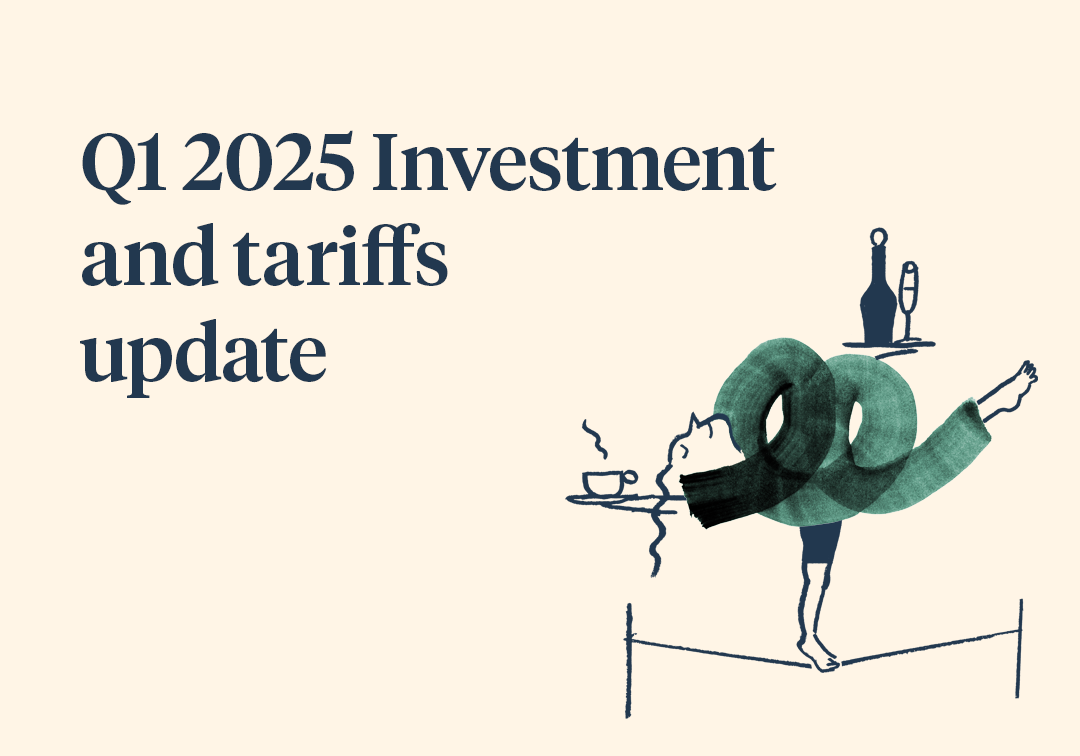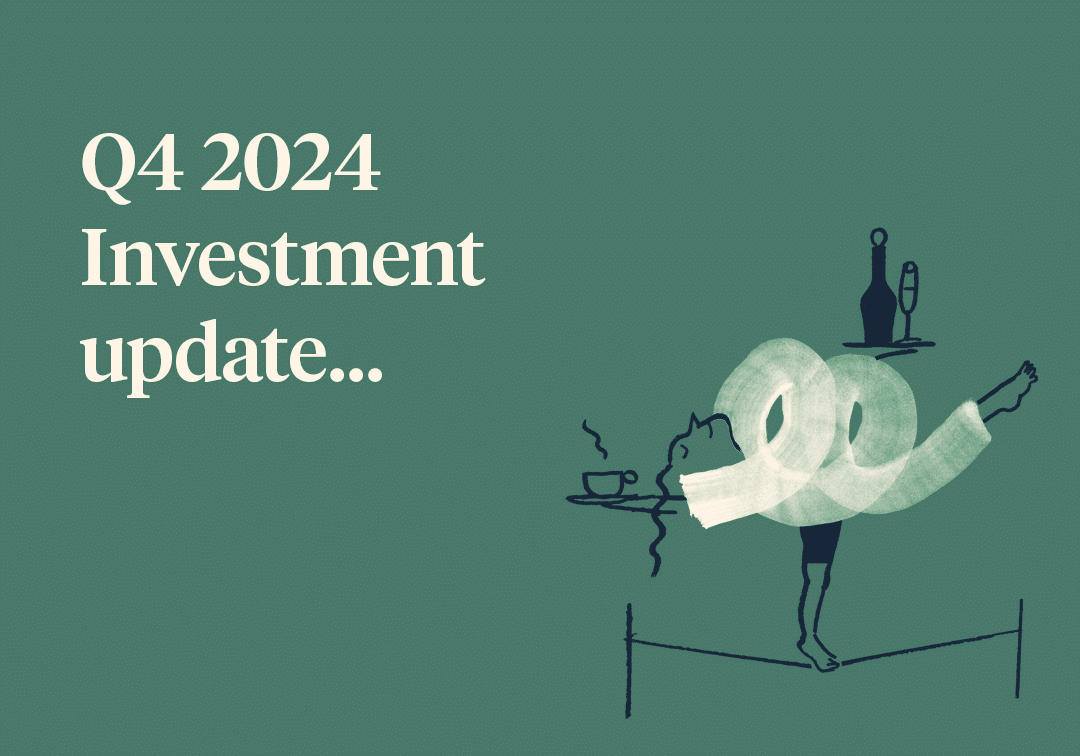Transcript
Jordan Gillies:
Hello and welcome to our Q3 2022 investment update. My name’s Jordan Gillies, and I’m one of the partners here at Saltus, and I’m once again joined by Michael Stimpson from our investment team to talk you through what’s happened in the previous quarter. It has been quite a ride, and I’m sure we’ve got a lot of nervous clients out there. The headlines are a little bit scary, and I know lots of people might want to be hearing about what’s happening with inflation, changes that the government in the UK are announcing, and really what’s happening in our portfolio. So what would be really, really helpful, I think, just as a start is for you to just give us a brief summary as to actually what’s gone on in the last quarter and what have been the big global headlines that we’ve been focusing on.
Michael Stimpson:
Sure. You mentioned the negative headlines, but if we remember back to early summer, there was actually quite a lot of optimism around. People were hoping that inflation was starting to come down, and we might see a bounce in risk assets from oversold levels. And we did see that at the beginning of the summer, but then reality hit with a bad US inflation report and some negative rhetoric from the Fed. And this led to central banks led by the US continuing to raise interest rates very aggressively, another 75 basis points in the US in September. And this has led to lots of volatility in global markets. And in fact, it’s sort of been more profound than that actually, because what’s happened is we have broken a 40-year down trend in global interest rates.
So we really are now in a new environment, central banks have made it very clear that they are happy to cause a recession to get on top of inflation. And I know we talked about this three months ago, and we said that this is what they were saying, but the reality is most investors have only just started listening carefully more recently and that’s what’s led to all of this volatility. Then to throw into the mix, the UK government launched their mini budget at really just the wrong time with very little detail on how promises would be funded and what long-term plans were. This led to some quite sharp moves. So 10-year UK government bond yields moved from 3.3% to 4.5% in a couple of days, which is really a very big move. And it’s fair to say, sitting here today, the UK government has got some work to do to regain the trust of financial markets.
Jordan Gillies:
That’s potentially an understatement I suppose for some. It’s going to be really interesting to see what happens. So look, in that context, what actually have we been able to do to try and protect portfolios? Are there any opportunities that we’ve been taking? And really what actions have we taken, Mike?
Michael Stimpson:
Well, as I said, Jordan, we’ve been talking for the last three months about the fact that central banks would rather risk recession than inflation. And what this has meant is that we were quite well positioned going into this. We had no UK government bonds, we had lots of US dollar exposure, we had lots of alternative assets that have been performing well, some overseas holdings, both equities and currencies. And all of that has meant that as we look back on the last three months, portfolios are broadly flat, no one’s lost more than 0.5% or gained more than 0.5%. And this is in the context of global equities falling another 7%, global bonds falling another 4.5%.
Michael Stimpson:
So if I sort bring that into a year-to-date to the end of September, equities are down over 20%, bonds are down around 13%, and our portfolios are down somewhere between 4% and 11% depending on your risk profile. Now, while it’s very frustrating to lose money, and we know our clients don’t invest with us for us to show them losses, it is important to say that these numbers are well ahead of benchmarks and well ahead of the peer group. And what that means is if we are able to keep capital broadly intact on the downside, it means we can be more on the front foot and take advantage of opportunities as things stabilise. And that’s where we’re beginning to look now as we go into the fourth quarter.
Jordan Gillies:
And so really, it’s about protection of capital in order to then be able to move quickly to look at these opportunities. And so that’s an interesting way to look at things, Mike, because with all this noise, a lot of people kind of want us on the defensive mode. So are there any future opportunities that you see? At what point do you move from a defensive strategy to a slightly more opportunistic one?
Michael Stimpson:
It’s a good question. I mean, I think the answer is that you are always trying to do both. But as we sit here today, there are some big dislocations in the market. So a two-year UK government bond now offers you 4.2% return, and a two-year US bond also offers you more than 4%. Now, if we are heading into a recession, it’s unlikely that interest rates will get that high. And so these are potentially good opportunities to make some defensive investments that will perform well if things get more difficult. At the other end of the scale, you have some US corporate bonds, high-yield bonds now yielding 10%. So it’s possible that we might want to take some money out of the equity market and invest in high-yield corporate debt, taking a little bit less risk, but still with those sort of 10% returns achievable.
There are also other opportunities around. Japan looks to be interesting at the moment. We already have an overweight position and are continuing to add to both equities and the currency with the yen looking one of the most undervalued currencies around. But as we sit here today, we do expect more opportunities to present themselves in the coming weeks and months. If we look ahead just next week, in China, we have the start of the Communist Party conference, which starts on 16th October and lasts a week. And so by the end of October, we should have a better idea of what Chinese policy is going to look like. Now, that could be good news or bad news. The market’s hoping for some good news there, but it’s not clear what’s going to happen. It’s not clear what Xi will be able to do. And so we have to continue to stay flexible.
Jordan Gillies:
And Mike, sorry to jump in, just how much does all this, in terms of good or bad, how much does all this hang on inflation? And really do we have any views at all on what the trend is there?
Michael Stimpson:
Inflation is the absolute number one thing that everyone has to watch. And the reality is that right now we might be passing through the period of peak bad news, as it were. Because what we are going to need in order to stabilise is to have strong evidence of declining inflation, so a consistent monthly sequence of declining numbers, which will need to go on for at least another four, five, six months before the markets have any confidence that we have this under control. And so what that means is that for now, risk budgets continue to be dialled back. We won’t be using our full risk allocations in the near term. But we do still have to look for opportunities as we go, and it’s trying to find that balancing act to make money where there’s the opportunity to do that. But we are definitely in sort of capital preservation mode and not at full speed on our risk budgets for now.
Jordan Gillies:
Okay. So it’s sort of definitely still on the defensive, but doing it in a sophisticated way, rather than sort of either or. Okay. Fantastic. Well, look, we really appreciate that this is a challenging period, and so we’d really invite and welcome you to get in touch with your advisers. We’re actively reaching out to clients all the time as well. But if you would like to discuss your portfolio with anyone at Saltus, we’d be delighted to help. So, look, thanks so much for joining us, and we look forward to seeing you again at our next quarterly update.
Do you need help managing your investments?
Our team can recommend an investment strategy to meet your financial objectives and give you peace of mind that your investments are in good hands. Get in touch to discuss how we can help you.

Article sources
Editorial policy
All authors have considerable industry expertise and specific knowledge on any given topic. All pieces are reviewed by an additional qualified financial specialist to ensure objectivity and accuracy to the best of our ability. All reviewer’s qualifications are from leading industry bodies. Where possible we use primary sources to support our work. These can include white papers, government sources and data, original reports and interviews or articles from other industry experts. We also reference research from other reputable financial planning and investment management firms where appropriate.
The views expressed in this article are those of the Saltus Asset Management team. These typically relate to the core Saltus portfolios. We aim to implement our views across all Saltus strategies, but we must work within each portfolio’s specific objectives and restrictions. This means our views can be implemented more comprehensively in some mandates than others. If your funds are not within a Saltus portfolio and you would like more information, please get in touch with your adviser. Saltus Asset Management is a trading name of Saltus Partners LLP which is authorised and regulated by the Financial Conduct Authority. Information is correct to the best of our understanding as at the date of publication. Nothing within this content is intended as, or can be relied upon, as financial advice. Capital is at risk. You may get back less than you invested. Tax rules may change and the value of tax reliefs depends on your individual circumstances.
Related blog posts
About Saltus?
Find out more about our award-winning wealth management services…
Winner
Best Wealth Manager
Winner
Investment Performance: Cautious Portfolios
Winner
Top 100 Fund Selectors 2024
Winner
Best Places to Work 2024
£8bn+
assets under advice
20
years working with clients
350+
employees
97%
client retention rate

